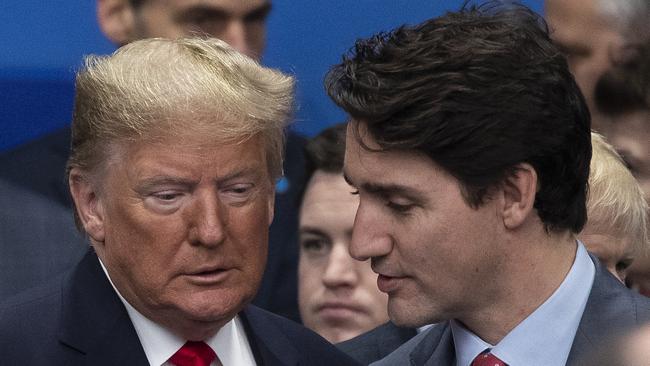Justin Trudeau to stay on as Canadian PM while Liberals select a new leader
Justin Trudeau’s resignation has posed new challenges, with parliament being prorogued for more than two months to allow the selection of a new leader and critics warning the country will be left adrift.

Justin Trudeau will remain Prime Minister while the Liberal Party selects a new leader after he announced his resignation and revealed parliament would be prorogued for more than two months, igniting fears that Canada will be left rudderless in the face of mounting national challenges.
When Donald Trump takes power on January 20, Mr Trudeau will still be the Prime Minister and be required to lead the initial response to proposed introduction by the US of a 25 per cent tariff on all Canadian goods. The two names suggested as leading candidates to succeed Mr Trudeau include his former deputy and finance minister Chrystia Freeland – whose resignation in December helped ignite the current political crisis – and former Bank of England and Bank of Canada governor Mark Carney.
Others suggested as possible successors to Mr Trudeau included Finance Minister Dominic LeBlanc, Foreign Affairs Minister Melanie Joly, Innovation, Science and Industry Minister François-Philippe Champagne, Transport Minister Anita Anand and former premier of British Columbia Christy Clark.
Mr Trudeau revealed on Monday (Tuesday AEDT) that he had asked the Governor-General to prorogue the parliament until March 24, allowing the Liberal Party time to elect a new leader but sparking criticism it would also leave the nation adrift for weeks.
It was immediately seen as a tactic aimed at preventing the House from supporting a no-confidence vote in the government before someone new could be installed, with Conservative Party leader Pierre Poilievre swiftly challenging Mr Trudeau to bring on an immediate election.
“Why not exercise his legal right to call an election now and face me?” Mr Poilievre posted on X. “Because he is too weak and afraid. So the country now spirals out of control with a weak lame-duck PM, while Liberals fight each other for power.”
It is likely that a successor to Mr Trudeau will not be in power for long. Once the prorogation ends, the first vote is expected to be a confidence motion and a defeat will trigger a new election.
The Liberal Party will now hold a meeting of its national board of directors to begin the “nationwide democratic process of selecting a new leader”. Candidates will need to be a registered Liberal for 41 days before the day of the vote and deliver a written nomination to the party president with 300 signatures from members.
Announcing his resignation, Mr Trudeau said he had advised the Governor-General the nation needed a new session of parliament. “She has granted this request, and the House (of Commons) will now be prorogued until March 24,” Mr Trudeau said.
“I intend to resign as party leader, as prime minister, after the party selects its next leader through a robust, nationwide, competitive process. Last night, I asked the president of the Liberal Party to begin that process,” he said. “This country deserves a real choice in the next election, and it has become clear to me that if I’m having to fight internal battles, I cannot be the best option in that election.”
Mr Trump responded to Mr Trudeau’s announcement by continuing to advocate for Canada to become the 51st state, arguing this would be one way for the country to avoid being hit by his proposed 25 per cent tariff.
Posting on his Truth Social platform, Mr Trump said that many Canadians loved the idea of becoming part of America.
“The US can no longer suffer the massive Trade Deficits and Subsidies that Canada needs to stay afloat,” he posted. “Justin Trudeau knew this, and resigned.
“If Canada merged with the US, there would be no Tariffs, taxes would go way down, and they would be TOTALLY SECURE from the threat of the Russian and Chinese Ships that are constantly surrounding them.
“Together, what a great Nation it would be!!”




To join the conversation, please log in. Don't have an account? Register
Join the conversation, you are commenting as Logout